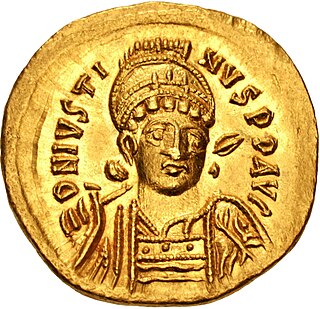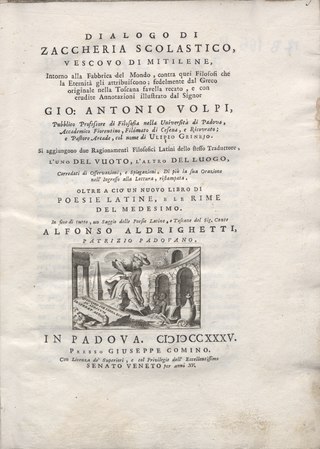Related Research Articles

Justinian I, also known as Justinian the Great, was Eastern Roman emperor from 527 to 565.
Procopius of Caesarea was a prominent late antique Greek scholar and historian from Caesarea Maritima. Accompanying the Roman general Belisarius in Emperor Justinian's wars, Procopius became the principal Roman historian of the 6th century, writing the History of the Wars, the Buildings, and the Secret History.

Year 518 (DXVIII) was a common year starting on Monday of the Julian calendar. At the time, it was known as the Year of the Consulship of Paulus without colleague. The denomination 518 for this year has been used since the early medieval period, when the Anno Domini calendar era became the prevalent method in Europe for naming years.

Justin I, also called Justin the Thracian, was Eastern Roman emperor from 518 to 527. Born to a peasant family, he rose through the ranks of the army to become commander of the imperial guard and when Emperor Anastasius died, he out-maneouvered his rivals and was elected as his successor, in spite of being around 68 years old. His reign is significant for the founding of the Justinian dynasty that included his eminent nephew, Justinian I, and three succeeding emperors. His consort was Empress Euphemia.
Choricius of Gaza was a Gaza-based Greek sophist and rhetorician of Late Antiquity. With writings dating to the early sixth century, he flourished in the time of Anastasius I as a scholar and public orator. He is considered as part of the Rhetorical School of Gaza, of which he later became the chair.
Procopius of Gaza was a Christian sophist and rhetorician, one of the most important representatives of the famous school of his native place. Here he spent nearly the whole of his life teaching and writing and took no part in the theological movements of his time.
The Battle of Callinicum took place on Easter Saturday, 19 April 531 AD, between an army of the Byzantine Empire under Belisarius and a Sasanian cavalry force commanded by Azarethes. After being defeated at the Battle of Dara, the Sasanians moved to invade Roman Syria in an attempt to turn the tide of the war. Belisarius' rapid response foiled the plan, and his troops pushed the Persians to the Syrian border through maneuvering before forcing a battle in which the Sasanians won a Pyrrhic victory.
The Patrologia Graeca is an edited collection of writings by the Christian Church Fathers and various secular writers, in the Greek language. It consists of 161 volumes produced in 1857–1866 by J.P. Migne's Imprimerie Catholique, Paris.

Kaleb, also known as Saint Elesbaan, was King of Aksum, which was situated in modern-day Eritrea and Ethiopia.
Gaza may refer to:
Aeneas of Gaza was a Neo-Platonic philosopher and a convert to Christianity who flourished towards the end of the fifth century. He is considered part of the Rhetorical School of Gaza, which flourished in Byzantine Palaestina in the fifth and sixth centuries.
This article presents a list of the historical events and publications of literature during the 6th through 9th Centuries.

Theodora was a Byzantine empress and wife of emperor Justinian. She was from humble origins and became empress when her husband became emperor in 527 and was one of his chief advisers. Theodora is a saint in the Eastern Orthodox Church and the Oriental Orthodox Church, commemorated on 28 June.

Dara or Daras was an important East Roman fortress city in northern Mesopotamia on the border with the Sassanid Empire. Because of its great strategic importance, it featured prominently in the Roman-Persian conflicts. The former archbishopric remains a multiple Catholic titular see. Today, the village of Dara, in the Mardin Province occupies its location.
Procopius or Prokopios is a given name which may refer to:

The Anastasian War was fought from 502 to 506 between the Byzantine Empire and the Sasanian Empire. It was the first major conflict between the two powers since 440, and would be the prelude to a long series of destructive conflicts between the two empires over the next century.

Zacharias of Mytilene, also known as Zacharias Scholasticus or Zacharias Rhetor, was a bishop and ecclesiastical historian.
Maiuma was an ancient town at the site of present-day Rimal near Gaza, Palestine.
Gessius of Petra was a physician, iatrosophist and pagan philosopher active in Alexandria in the late 5th and early 6th century.
The Rhetorical School of Gaza was a group of influential scholars based in Gaza in Late Antiquity, many of whom exhibited a teacher-pupil relationship and participated as orators in local public life. Famous chairs of the school included Aeneas, Procopius, and Choricius.
References
- Parry, Ken; David Melling; et al., eds. (1999). The Blackwell Dictionary of Eastern Christianity. Malden, MA.: Blackwell Publishing. ISBN 0-631-23203-6.
- Matthew Bunson, editor. Encyclopedia of Catholic History, article on Aeneas of Gaza